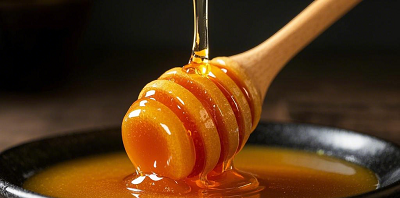Can Honey Benefit Benign Prostatic Hyperplasia (BPH)?
The potential benefits of honey for benign prostatic hyperplasia (BPH) have sparked significant interest in the field of men’s health. As a natural food with rich nutritional and medicinal properties, honey has been widely praised. With aging populations and rising cases of prostate disorders, many men are exploring natural alternatives to alleviate symptoms.

How Honey May Influence Prostate Health
BPH is a common male health concern, especially among those over 40. As men age, the prostate naturally enlarges, potentially causing urinary difficulties such as frequent urination and urgency. But can honey help with BPH? Scientific studies offer some promising insights.
Honey is rich in antioxidants like flavonoids, phenolic acids, and vitamin C, which help neutralize free radicals and reduce oxidative stress—a factor linked to prostate tissue damage. Research indicates that chronic inflammation is closely related to BPH, and honey’s anti-inflammatory properties may help mitigate this response. Specifically, compounds such as quercetin and rutin in honey have been found to inhibit inflammatory cytokines, potentially reducing prostate swelling.
Additionally, honey supports immune function, which is crucial for maintaining prostate health. Some studies suggest that certain components in honey may have mild anti-androgenic effects. Since elevated androgen levels are a known risk factor for BPH, this property may offer further protective benefits.
However, it is important to note that clinical studies directly examining honey’s effects on BPH are still limited. Most available evidence comes from laboratory and animal studies, highlighting the need for further human trials. Despite this, honey remains a safe and nutritious natural product with recognized health benefits, making it a potentially supportive element in prostate care.
To further relieve urinary symptoms caused by prostate enlargement, the traditional Chinese medicine formula Diuretic and Anti-inflammatory Pill can be considered. This herbal remedy is known for its ability to reduce inflammation, promote blood circulation, and improve urinary function. By addressing both the root cause and symptoms of BPH, it helps restore prostate health naturally.
Broader Health Benefits and Considerations for Men
Beyond its possible benefits for BPH, honey contributes to overall male health in several ways. When considering whether honey is beneficial for BPH, it is useful to take a broader perspective on men’s well-being.
Firstly, honey serves as an excellent energy source, containing essential vitamins and minerals such as B vitamins, calcium, zinc, and iron. Zinc, in particular, plays a critical role in prostate health, and honey naturally contains this vital mineral.
Secondly, honey has natural antibacterial properties, which may help prevent urinary tract infections (UTIs). BPH patients often face a higher risk of UTIs due to incomplete bladder emptying. Honey contains glucose oxidase, an enzyme that produces hydrogen peroxide, giving it mild antimicrobial effects.
Moreover, honey can improve sleep quality, which is essential for hormonal balance and overall prostate health. It promotes the natural release of melatonin, helping regulate the sleep-wake cycle and indirectly supporting prostate function.
That said, some precautions should be considered when consuming honey. Since honey is high in natural sugars, diabetic individuals should consume it in moderation under medical supervision. Additionally, though rare, some people may have allergic reactions to honey. Infants under one year old should not consume honey due to the risk of botulism.
The quality of honey also matters. Adulterated honey is prevalent in the market, so choosing raw, high-quality honey is crucial. Unprocessed honey retains more active compounds and may provide greater health benefits.
Honey as a Complementary Approach to BPH Management
While discussing honey’s potential role in BPH management, it’s essential to acknowledge that honey should not replace standard medical treatments but may serve as a complementary approach.
Some research suggests that honey, when combined with other bee products such as pollen or propolis, may enhance prostate health. Propolis, for example, is rich in flavonoids and bioactive compounds known for their anti-inflammatory and antiproliferative properties. A small clinical study indicated that BPH patients who took propolis extract experienced improvements in symptom scores and urinary flow rates. When used together, honey and other bee-derived products may offer a more comprehensive protective effect.
From a broader health perspective, honey can aid in weight management, an important factor since obesity is linked to an increased risk of BPH. However, moderation is key—honey should be incorporated into a balanced diet rather than consumed excessively.
Different types of honey may have varying health effects. For example, Manuka honey is known for its strong antibacterial properties, while buckwheat honey has higher antioxidant content. Some varieties may be more beneficial for prostate health, though further research is needed in this area.
Many men report anecdotal benefits from drinking warm water with honey to ease mild urinary discomfort. While these experiences are not yet scientifically validated, they highlight honey’s long-standing role in traditional wellness practices. Future studies may provide a clearer understanding of the underlying mechanisms.
For those looking for a more targeted approach, Diuretic and Anti-inflammatory Pill offers a comprehensive herbal solution for BPH symptoms. This formula not only helps clear urinary obstructions but also alleviates pain and discomfort, supporting long-term prostate health.
Conclusion
Although honey is not a cure for BPH, existing evidence suggests that, as part of a healthy lifestyle, moderate consumption of high-quality honey may offer certain protective benefits for prostate health. As scientific research continues, we may gain deeper insights into honey’s exact role in supporting prostate function.
Recommended readings:
Suspecting Benign Prostatic Hyperplasia (BPH)? Take This Quick Test!
BPH and Prostatitis - Differences in Signs and Symptoms
Does Benign Prostatic Hyperplasia Require Prostate Removal for Everyone?



